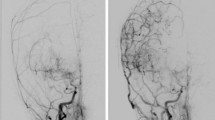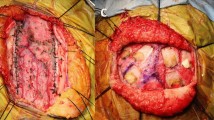Abstract
Purpose
Few guidelines exist for genetic testing of patients with moyamoya arteriopathy. This study aims to characterize the yield of genetic testing of non-syndromic moyamoya patients given the current pre-test probability.
Methods
All pediatric moyamoya patients who received revascularization surgery at one institution between 2018 and 2022 were retrospectively reviewed. Patients with previously diagnosed moyamoya syndromes or therapeutic cranial radiation were excluded.
Results
Of 117 patients with moyamoya, 74 non-syndromic patients (44 females, 59%) were eligible. The median age at surgery was 8.1 years. Neurosurgeons referred 18 (24%) patients for neurogenetic evaluation. Eleven (61%) patients subsequently underwent genetic testing. Eight (73%) patients had available testing results. Five (62.5%) of these patients had developmental delay compared to 16 (22%) of the entire cohort. Six (75%) patients who underwent genetic testing were found to have at least one genetic variant. These results led to diagnosis of a new genetic disorder for 1 (12.5%) patient and screening recommendations for 2 (25%) patients. An RNF213 variant in one patient led to recommendations for family member screening and pulmonary hypertension screening. Another patient was diagnosed with CBL disorder and referred for cancer screening. The median age at surgery in patients with clinically actionable findings was 4.6 years compared to 9.2 years in those who were referred for genetic testing. All 3 patients who had an actionable finding had developmental delay.
Conclusion
It may be beneficial to refer moyamoya patients under 5 for genetic screening given the high likelihood of discovering actionable mutations.

Similar content being viewed by others
Data availability
The datasets generated and analyzed during the current study are not publicly available in order to protect study participant privacy.
References
Mertens R, Graupera M, Gerhardt H, Bersano A, Tournier-Lasserve E, Mensah MA et al (2022) The genetic basis of moyamoya disease. Transl Stroke Res 13(1):25–45
Guey S, Tournier-Lasserve E, Herve D, Kossorotoff M (2015) Moyamoya disease and syndromes: from genetics to clinical management. Appl Clin Genet 8:49–68
Liu W, Morito D, Takashima S, Mineharu Y, Kobayashi H, Hitomi T et al (2011) Identification of RNF213 as a susceptibility gene for moyamoya disease and its possible role in vascular development. PLoS ONE 6(7):e22542
Kobayashi H, Kabata R, Kinoshita H, Morimoto T, Ono K, Takeda M et al (2018) Rare variants in RNF213, a susceptibility gene for moyamoya disease, are found in patients with pulmonary hypertension and aggravate hypoxia-induced pulmonary hypertension in mice. Pulm Circ 8(3):2045894018778155
Kobayashi H, Brozman M, Kyselova K, Viszlayova D, Morimoto T, Roubec M et al (2016) RNF213 rare variants in Slovakian and Czech moyamoya disease patients. PLoS ONE 11(10):e0164759
Koizumi A, Kobayashi H, Hitomi T, Harada KH, Habu T, Youssefian S (2016) A new horizon of moyamoya disease and associated health risks explored through RNF213. Environ Health Prev Med 21(2):55–70
Linhares ND, Svartman M, Rodrigues TC, Rosenberg C, Valadares ER (2015) Subtelomeric 6p25 deletion/duplication: report of a patient with new clinical findings and genotype-phenotype correlations. Eur J Med Genet 58(5):310–318
Leardini D, Messelodi D, Muratore E, Baccelli F, Bertuccio SN, Anselmi L et al (2022) Role of CBL mutations in cancer and non-malignant phenotype. Cancers (Basel) 14(3)
Niemeyer CM, Kang MW, Shin DH, Furlan I, Erlacher M, Bunin NJ et al (2010) Germline CBL mutations cause developmental abnormalities and predispose to juvenile myelomonocytic leukemia. Nat Genet 42(9):794–800
Guey S, Grangeon L, Brunelle F, Bergametti F, Amiel J, Lyonnet S et al (2017) De novo mutations in CBL causing early-onset paediatric moyamoya angiopathy. J Med Genet 54(8):550–557
Ahn HS, Kazmi SZ, Kang T, Kim DS, Ryu T, Oh JS et al (2020) Familial risk for moyamoya disease among first-degree relatives, based on a population-based aggregation study in Korea. Stroke 51(9):2752–2760
Zhang Q, Ge P, Ma Y, Zhang D, Wang R, Zhang Y et al (2019) Clinical features and surgical outcomes of patients with moyamoya disease and the homozygous RNF213 p.R4810K variant. J Child Neurol 34(13):793–800
Togao O, Mihara F, Yoshiura T, Tanaka A, Kuwabara Y, Morioka T et al (2004) Prevalence of stenoocclusive lesions in the renal and abdominal arteries in moyamoya disease. AJR Am J Roentgenol 183(1):119–122
Guey S, Kraemer M, Herve D, Ludwig T, Kossorotoff M, Bergametti F et al (2017) Rare RNF213 variants in the C-terminal region encompassing the RING-finger domain are associated with moyamoya angiopathy in Caucasians. Eur J Hum Genet 25(8):995–1003
Author information
Authors and Affiliations
Contributions
Conception and design of study: ALS, LLL, ERS, SS, APS. Acquisition of data: ALS, SS. Data analysis and interpretation: ALS, DSK, SS, APS. Drafting the article: ALS, DSK. Critical revision of the article: ALS, DSK, LLL, ERS, SS, APS. Final approval of the version to be published: ALS, DSK, LLL, ERS, SS, APS.
Corresponding author
Ethics declarations
Ethics approval
This study protocol was reviewed and approved by our local Institutional Review Board (IRB), protocol approval number IRB-P00041791.
Consent for publication
Local IRB determined this research met regulatory requirements necessary for waiver of informed consent/authorization.
Competing interests
The authors declare no competing interests.
Additional information
Publisher's Note
Springer Nature remains neutral with regard to jurisdictional claims in published maps and institutional affiliations.
This study has not been presented previously.
Rights and permissions
Springer Nature or its licensor (e.g. a society or other partner) holds exclusive rights to this article under a publishing agreement with the author(s) or other rightsholder(s); author self-archiving of the accepted manuscript version of this article is solely governed by the terms of such publishing agreement and applicable law.
About this article
Cite this article
Slingerland, A.L., Keusch, D.S., Lehman, L.L. et al. Yield of genetic evaluation in non-syndromic pediatric moyamoya patients. Childs Nerv Syst 40, 801–808 (2024). https://doi.org/10.1007/s00381-023-06167-w
Received:
Accepted:
Published:
Issue Date:
DOI: https://doi.org/10.1007/s00381-023-06167-w




